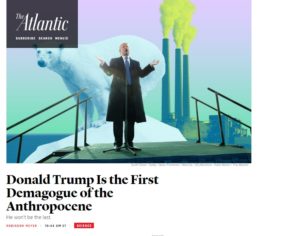
More from The Atlantic’s associate editor Robinson Meyer:
Spend enough time with some of the worst-case climate scenarios, and you may start to assume, as I did, that a major demagogue would contest the presidency in the next century. I figured that the catastrophic consequences of planetary warming would all but ensure the necessary conditions for such a leader, and I imagined their support coming from a movement motivated by ethnonationalism, economic stagnation, and hatred of immigrants and refugees. I pictured, in other words, something not so far from Trump 2016.
I just assumed it wouldn’t pop up until 2040.
…
Spend enough time with some of the worst-case climate scenarios, and you may start to assume, as I did, that a major demagogue would contest the presidency in the next century. I figured that the catastrophic consequences of planetary warming would all but ensure the necessary conditions for such a leader, and I imagined their support coming from a movement motivated by ethnonationalism, economic stagnation, and hatred of immigrants and refugees.
…
Trump is showing us how ill-prepared the United States is for post-climate demagoguery, and he gives us an opportunity to improve our societal immune response.
…
Climate change could push Western politics toward demagoguery and authoritarianism in two ways, then. First, it could devastate agricultural yields and raise food prices; destroy coastal real estate and wash away family wealth; transform old commodities into luxury goods. Second, it could create a wave of migration—likely from conflict, but possibly from environmental ruination—that stresses international reception systems and risks fomenting regional resource disputes.
In effect, it could erode people’s sense of security, pushing them toward authoritarianism.



